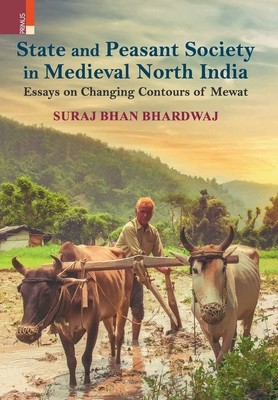
- We will send in 10–14 business days.
- Author: Suraj Bhan Bhardwaj
- Publisher: Primus Books
- ISBN-10: 9352908864
- ISBN-13: 9789352908868
- Format: 15.6 x 23.4 x 1.8 cm, kieti viršeliai
- Language: English
- SAVE -10% with code: EXTRA
State and Peasant Society in Medieval North India (e-book) (used book) | bookbook.eu
Reviews
Description
State and Peasant Society in Medieval North India uses a variety of sources--archival records, Indo-Persian court chronic and folk literature --to explore the perception of kingship in the peasant society and its linkages with the changing nature of interaction between the state and the peasant society in medieval north India, especially Mewat. Dwelling on this central theme, the essays in this book delve into a range of issues: the process of state formation in Mewat, the role of state in the socio-economic and religio-cultural transformation of the region's Meo community, the conflictual engagement between the peasant community and state in the late medieval period and the perception of kingship in folktales popular in the peasant society. The book chiefly argues that a nuanced understanding of how the medieval state impacted the peasants' lives can be better arrived at by looking into the subjectivities of their perceptions and experiences.
EXTRA 10 % discount with code: EXTRA
The promotion ends in 22d.01:54:15
The discount code is valid when purchasing from 10 €. Discounts do not stack.
- Author: Suraj Bhan Bhardwaj
- Publisher: Primus Books
- ISBN-10: 9352908864
- ISBN-13: 9789352908868
- Format: 15.6 x 23.4 x 1.8 cm, kieti viršeliai
- Language: English English
State and Peasant Society in Medieval North India uses a variety of sources--archival records, Indo-Persian court chronic and folk literature --to explore the perception of kingship in the peasant society and its linkages with the changing nature of interaction between the state and the peasant society in medieval north India, especially Mewat. Dwelling on this central theme, the essays in this book delve into a range of issues: the process of state formation in Mewat, the role of state in the socio-economic and religio-cultural transformation of the region's Meo community, the conflictual engagement between the peasant community and state in the late medieval period and the perception of kingship in folktales popular in the peasant society. The book chiefly argues that a nuanced understanding of how the medieval state impacted the peasants' lives can be better arrived at by looking into the subjectivities of their perceptions and experiences.


Reviews